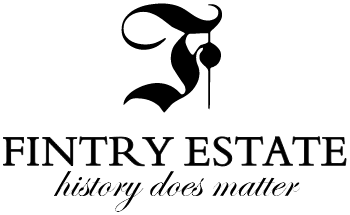Happy New Year to all,
As we tentatively embark on this new year here we are in the midst of making history, and we hope for better days ahead. This holiday season was certainly one to forget although we will never forget it, and we hope next Christmas to once again celebrate with our relatives and friends.
The Friends of Fintry are slowly gearing up for our 2021 summer season and are optimistically applying for grants for summer students in the hopes that things will be almost back to “normal”. We are continuing with our monthly Board meetings via ZOOM which I think everyone is delighted with as we don’t have to be concerned with travelling if roads are bad.
Our resident historian, Paul Koroscil has provided a very interesting missive on Dun-Waters’ life before he came to Fintry……enjoy!
Research Notes – The South Shropshire Hunt: Dun-Waters’ Annual Puppy Show
By Paul Koroscil
The traditional annual Dun-Waters’ Puppy Show represented another successful season of the South Shropshire Hunt Club. As I previously mentioned, standing in front of Plaish Hall I could well imagine the herd of dogs racing after the fox in that magnificent verdant undulating landscape.
The following précis provides you with a description of how well Dun-Waters was respected amongst the foxhound hunters in Shropshire and the country. Before reading the script you should pour yourself a dram of Laird of Fintry malt whisky (make sure it is the cask strength whisky) and imagine yourself at a colleague or friend’s testimonial dinner. In fact, half-way through the reading you may want to have a second dram!
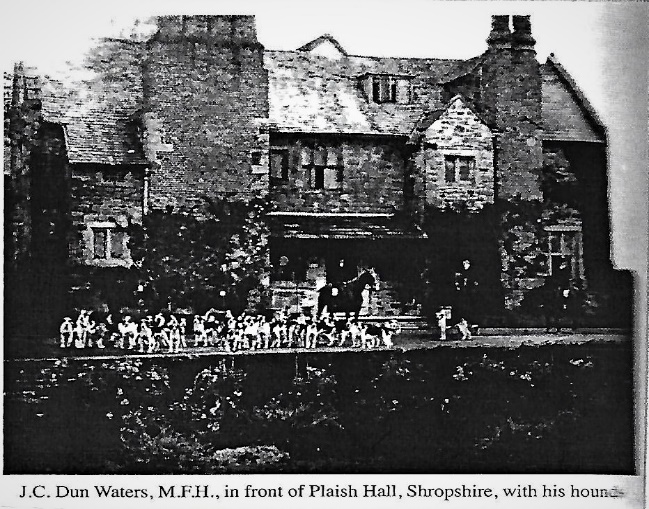
Now to the event. “Tell me a man’s a fox hunter and I loves ‘im at once”. This statement could not be uttered with greater sincerity by anyone than by Mr. J.C. Dun-Waters, the popular master of the South Shropshire Hounds, who came into Shropshire about five years ago as the Master of the Wheatland Hounds in succession to Mr. Rowland Hunt. The new master hunted the Wheatland County with a great deal of success and provided excellent sport for lovers of fox hunting. When it was decided last year to divide the Shropshire Country, Mr. Dun-Waters accepted the mastership of the South Shropshire pack, and became a Shropshire landowner, taking up his abode at Plaish Hall.
The season with the South Shropshire was very successful and Mr. Dun-Waters received loyal support from landlords and farmers as was evidenced by ‘the almost entire absence’ of barbed wire in the country.
Puppy walkers were also plentiful and at the annual show, which was held on Tuesday at Plaish Hall, some splendid fox hounds were shown, which elicited much praise from the judges – Mr. C.W. Wicksted, Mr. C. Payne (Dumfries-shire) and Mr. Rawle (huntsman to Lord Fitzhardinge’s hounds). The awards were made as follows – Dogs: 1,”Sportsman,” walked by Miss Lambert and the Rev. J.C.E. Paterson; 2, “Acrobat”, Mr. Morgan, Crossage; 3, “Dancer”, Miss Marie Stuart; 4, “Barnaby”, Mr. Peter Everall, Ryton.
Bitches: 1, “Gamble”, walked by Mr. Farmer, Eaton Constantine; 2, “Treasure”, Mr. Clayton, Much Wenlock; 3, “Rosemary”, Dr. Hillyar; 4, “Tragedy”, Mr. Clayton.
At the conclusion of The Puppy Show a large company accepted the invitation of Mr. and Mrs. Dun-Waters to a luncheon, which was served in a marquee under the direction of Mr. Leman. Mr. Dun-Waters, who had undergone an operation for an old injury to his left knee, (could that be a result of an old rugby injury) and had not sufficiently recovered to leave an invalid’s chair, presided, and among those also present were a number of some of the dignitaries: Sir Walter Smythe, Bart Colonel Cotes, Mr. E.B. Feilden, M.P. (Condover Hall), Mr. & Mrs. T.F. Kynnersley (Leighton Hall), Mr. W. Nelson, M.F.H. (Loton Park), Dr. McClintock, (Church Stretton), Mr. & Mrs. Morris (Oxon), the Rev. Mr. Jerrold (Easthope), and a large number of farmers and their wives.
After the repast, Mr. Dun-Waters proposed the loyal toasts, describing the King as one of the best sportsmen in England and the greatest gentleman. The toast was received with cheers. The President again addressed the assembly. He said he was thankful to say he was not a proud man, but he certainly did feel proud when he had his first glass in his hand to drink to the health of his South Shropshire puppy walkers. He hoped that when he was sound again that he would meet them all and that he would meet them as Master of the Hounds for many years to come. (Applause). As they attended each successive show they would get older and wiser in many ways and perhaps a great many grey hairs would come out. They could console themselves with the fact that “Grey ‘airs is nothin’. I’ve seen ‘em all grey before now”. (Laughter). They could also console themselves with the fact that it was often the oldest dog in the pack, with the greatest number of grey hairs in its head which helped to catch the fox. (Applause). However, they must return to fox hunting. They had a very good season. He was thankful to those ladies and gentlemen who had helped him to bring it to such a successful issue. The country had again become a united South Shropshire country; with good sportsmen and sportswomen residing in it.
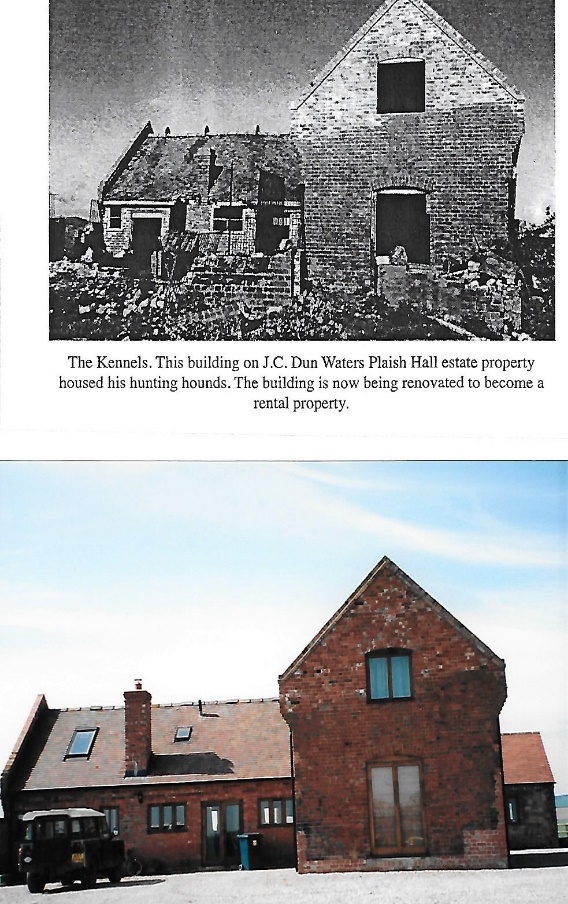
Completion of the renovation of the Kennels as a holiday let
The most genial work of a Master of Foxhounds was with his hounds in the kennels and among his people in the country that was if they were the right sort – and he was particularly fortunate in that respect. He thought a great deal of credit was due to fathers and mothers of South Shropshire for having got together such an extremely useful and willing pack as his puppy-walkers. (Laughter). Considering the time of the year he thought the puppies were in splendid condition and they looked even better when they came out of the hands of the puppy-walkers. Therefore, he would ask them to drink to the health of the puppy-walkers and he would associate with the toast the names of Mr. Farmer of Eaton Constantine, and Mr. Morgan of Cressage; Mr. Farmer in reply said that the puppy-walkers had been very pleased to do what they could to assist Mr. Dun-Waters. – Mr. Morgan also replied in similar terms and added he hoped to be a first-prize winner some day.
Mr. T.F. Kynnersley proposed the health of the judges, who said their duties that day had been doubly hard because the puppies shown had all been so good. The greatest credit was due to the puppy-walkers, but above all, their thanks were due to their well-known and esteemed master, Mr. Dun-Waters, (Applause). Mr. Wickstead, in responding to the toast, said he wished Mr. Dun-Waters good luck in that delightful country in providing the best sport in the world – that of fox-hunting. If they did what they could to help the master in the season and by walking his puppies, he thought they would find he would do his share to make the hunt successful. (Hear, hear). They hoped Mr. Dun-Waters would cast a halo round that country, and that he would continue to hunt until his hair was as grey as it possibly could be. (Laughter and applause). Mr. Payne also replied. He said he did not think it was difficult for a man who loved a foxhound to judge puppies. (Hear, hear). They had seen a very good entry of young hounds that day and Mr. Dun-Waters had the foundation of a very fine pack. Mr. Payne derived much pleasure from inspecting a pack of hounds. When at home they were apt to think they had something very good, and in fact better than anything owned by other people. That day he had seen two or three couples he would like very much to take back with him to Dumfries. With regard to Mr. Kynnersley’s reference to grey hairs he (Mr. Payne) remembered seeing plenty of them on one occasion when he found himself landed on the hills of Scotland in a snow storm 35 miles from home. They killed the fox in the evening and in returning during the night, he saw grey hairs innumerable. He landed home in time to see the people going to church on the Sunday morning. (Laughter). Mr. Rawle, another of the judges, said he was surprised to find such a good entry at the show that day, and Mr. Dun-Waters would no doubt get together one of the best packs of fox-hounds in the country. (Hear, hear).
The next toast, the health of Mr. & Mrs. Dun-Waters was proposed by Colonel Cotes, who remarked that it was about five years since Mr. Dun-Waters came to hunt the Wheatland country, and no man could have done it better. Last year, Mr. Dun-Waters took up the South Shropshire country and also bought an estate in the county. During the last season he had shown them excellent sport and they had some of the best runs in which they had taken part for many years. He (Colonel Cotes) thought those present would do all they could to help Mr. Dun-Waters to carry on the hunt. The puppy-walkers had done their best and they hoped everybody in the country would try and preserve foxes. (A voice: “Let them alone and they will preserve themselves”). He (Colonel Cotes) had hunted in the country for nearly 50 years and he knew there were many ways in which they could help a Master of Foxhounds. Landlords could do a great deal in the South Shropshire country. At one time there was a great deal of wire used, but now it had almost ceased to exist. Their thanks were due to the farmers for the way in which they had taken down the wire, and in that respect, they had set a good example to other parts of the county. (Hear, hear).
This tradition would continue for the next six years at Plaish Hall until Dun-Waters became interested in hunting big game animals. By the end of the nineteenth century, the hunting of big game animals around the world had “become a fashionable blood sport, particularly among the British and the collecting of trophy heads a status seeking activity”. However, sportsmen seeking out their prizes faced a world-wide problem of depleting game stocks although there were regions such as the Rocky Mountains in North America which was still perceived as an untapped wilderness area of wild game. In assessing the depletion problem in Canada, conservation issues such as the passing of specific game acts in each province were discussed by the newly formed League of Canadian Sportsmen in 1899. However, British Columbia did not pass a provincial game act until 1919. Even with the passing of the act it did not change the world’s sportsmen’s perception of wild game shooting in British Columbia. Books published in London, such as the 1925 “Game Trails in British Columbia”, written by B.C.’s chief game warden, continued to celebrate the big game of the former colony.”
It was this attraction of wilderness game shooting that prompted Dun-Waters to eventually emigrate to British Columbia and the Okanagan Valley in 1909. For Dun-Waters the Okanagan Valley offered an abundance of big game such as grizzly, black and brown bear, mule deer, elk (wapiti), cougar and bighorn sheep. He also had access to hunting in the Monashee, Selkirk and Purcell Ranges. It was also possible to explore more distant trophy hunting environments, such as Alaska, which he did in 1925. Just as Dun-Waters was passionate about fox hunting he was similarly passionate about big game hunting. At Fintry, he employed a taxidermist and had his architect J.J. Honeyman design a trophy room in the restored Manor House where the walls were decorated with the heads of his successful hunting trips.
With the decision to emigrate to the Okanagan, Dun-Waters resigned his position as Master of the Foxhounds of South Shropshire Hunt Club.
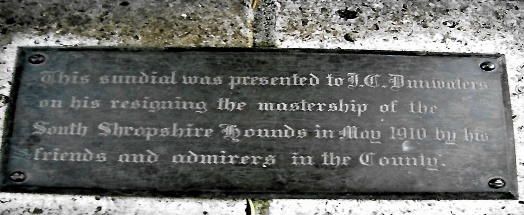
As a reminder of his dedication the Hunt Club presented him with a silver statuette of a foxhound and a sundial. Dun-Waters had the sundial placed on a pedestal on the front lawn of the Fintry Manor House. The Fintry archival photo shows the sundial on the pedestal with the engraved plaque. However, the pedestal today only displays the engraved Dun-Waters’ presentation plaque on the base of the pedestal. The sundial is missing on top of the pedestal.
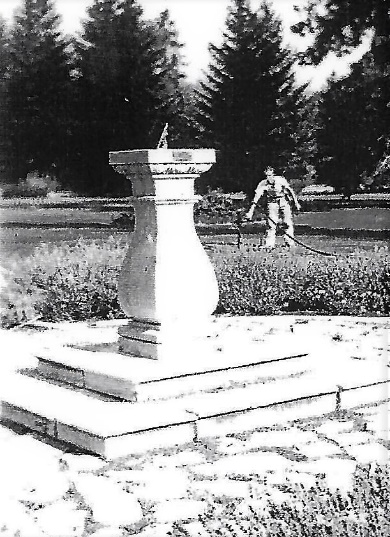
There is a second faded plaque located on the back of the base of the pedestal with a short poem presumably composed by one of the Hunt Club members.
“Serene he stands among the flowers,
And only marks life’s sunny hours.
For him dark days do not exist.
The brazen-faced old optimist.”
I hope you enjoyed the read and your dram – as Dun-Waters would say “Slainte Mhath!”
(pronounced “slanj-eh-vah”).
Sources: Wellington Journal and Shrewsbury News, 6 June, 1903
Paul Koroscil, The British Garden of Eden, 2nd ed. 208, pp 240-242.
In closing, I would like to remind you to tune into AM 11.50 from 8 ’til 10 Saturday mornings, the long running Don Burnett Garden Show, with Don Burnett, Ken Salvail and now including a weekly ” spot” from Fintry, a feature on the botanists and plant collectors of Scotland.
Stay safe.
Kathy Drew, Friends of Fintry Provincial Park
